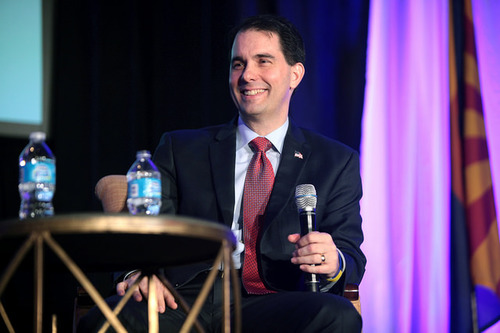
Credit: Gage Skidmore
In tightly scripted presidential campaigns, there are rarely moments of true candor. Occasionally, however, as they grope toward familiar talking points, candidates supply the next best thing: an unintentionally revealing remark, something that discloses a telling assumption or facet of their worldview. Over the weekend, Scott Walker offered just such a revelation.
Walker was campaigning in South Carolina on Sunday, the anniversary of Michael Brown’s death, when he was asked what he would do to restore trust between African-Americans and the police. Now, there are plenty of reasons why Republican politicians might strongly prefer not to talk about race and policing. Still, in this climate, top-tier candidates should at least have a canned answer at the ready. Amazingly, “let’s not talk about it” was Walker’s answer. “I think in general if anyone focuses on racial discord we’re going to get more,” he warned. “If we focus on unity,” he suggested, “we’re going to get more of that.”
This answer becomes more remarkable when you consider the available alternatives. Walker might have rejected the premise and insisted that Ferguson was anomalous. He might have attempted a law-and-order argument about how respect for police authority is the best way to de-escalate dangerous situations. He might have proferred a small-government answer about maximizing freedom by reining in excessive policing. He might have crafted a silent majority-style answer about how most Americans do respect the police, and that the actions of a few disgruntled protestors shouldn’t distract us from the good work done by law enforcement. Any of these answers would have found support among at least some conservative voters.
Instead, Walker chose the unusual strategy of tacitly accepting the premise—racial tensions do exist, especially around policing—but rejecting the idea that anything should be done about it. In this respect, his comment is even stranger than its closest analogue in recent memory, Mitt Romney’s infamous suggestion that inequality should be discussed only in “quiet rooms.” Romney’s discomfort with open discussions of inequality was, at least, premised on his belief that concerns about inequality were little more than “envy” and “class warfare.” On race, Walker has essentially the same policy advice as Romney did on inequality—shut up about it—but without a similar conviction that the problem is manufactured.
This creates a certain ambiguity in Walker’s airy appeal to national unity. Concerns about deep divisions in American society are common, but almost everybody who writes about the topic believes that the feeling of belonging—of meaningful membership in American democracy—has both subjective and objective dimensions. It’s hard to argue that certain people are really included in American life if they themselves don’t feel included, but it’s also hard to maintain that the subjective feeling of inclusion alone is sufficient. There are objective civic and material conditions, which might include (depending on who you ask) things like the right to vote and some source of income.
If this is the case, then unity is something that doesn’t exist on its own: it has to be built and maintained, and when its objective conditions start to crumble, commands to merely beef up our subjective feelings of belonging ring hollow. Walker seems to think that unity is a quality that Americans simply have—and that they should recognize and celebrate it, instead of harming it with all this talk of discord. The problem is that many of the people who are supposed to have this feeling evidently disagree.
Click to
View Comments